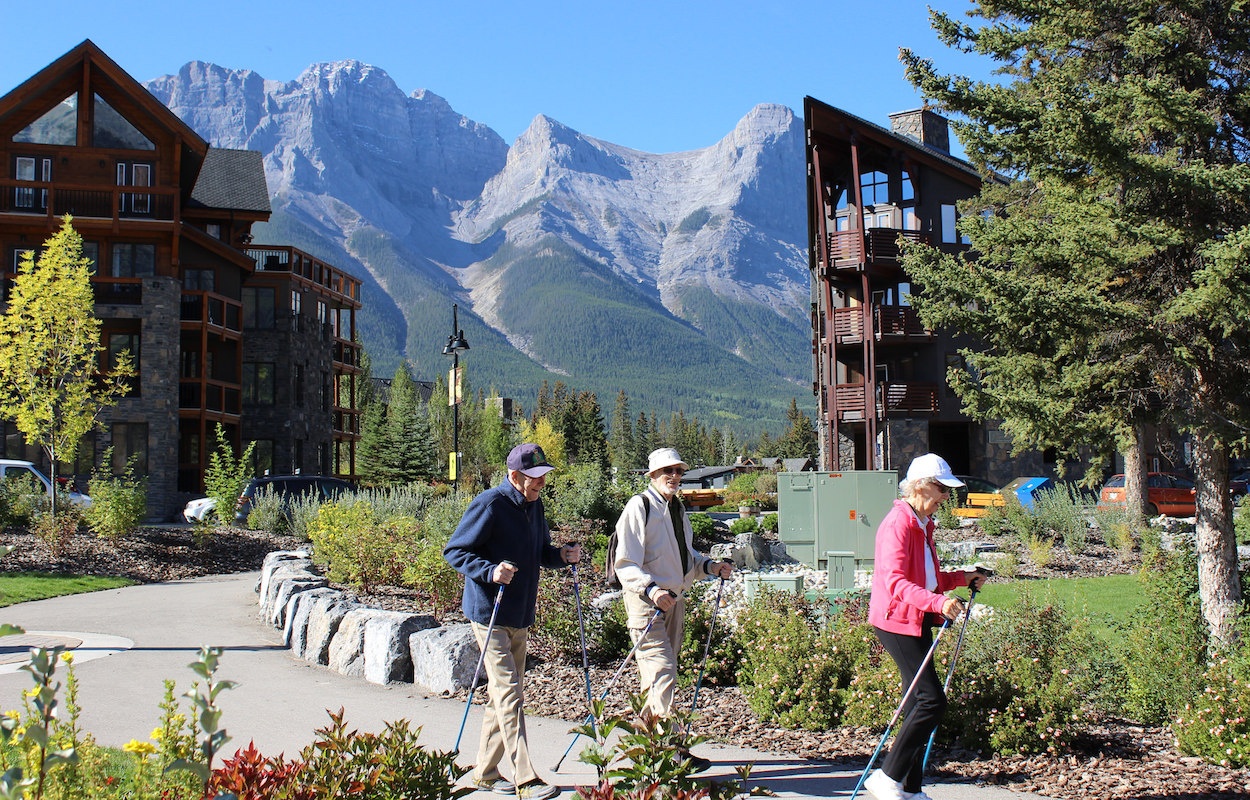 “Sixty per cent of senior Canadians are inactive, and the World Health Organization has found that sitting or lying for long periods is, in fact, a serious health risk.” Staying physically active is one of the most important things you can do as you get older. Keeping up with activity will help maintain your mental and physical health, and improve your overall quality of life.
“Sixty per cent of senior Canadians are inactive, and the World Health Organization has found that sitting or lying for long periods is, in fact, a serious health risk.” Staying physically active is one of the most important things you can do as you get older. Keeping up with activity will help maintain your mental and physical health, and improve your overall quality of life.
Though Origin Active Lifestyle Communities throughout Canada are supporters of active living for all seniors, we also understand the safety concerns many family members and friends may have. Staying physically active is generally safe for most older adults, but if you are worried about the senior in your life, here are some tips to safely promote active living.
Create Space in Their Home
The Canadian Society for Exercise Physiology (CSEP) recommends that adults 18 years and older do at least 150 minutes of moderate-to-vigorous intensity exercise a week, with each session lasting a minimum of 10 minutes. However, studies show that engaging in basic, daily living activities can also have extensive health benefits. These activities can include cooking, cleaning the house, or playing with your pet. Be sure that the senior in your life has ample space in their home to allow for these activities, as it is important to maintain safety. Remove or replace any items that might be creating a tripping hazard such as area rugs or electrical cords.
While you are in the process of moving things out of the way, remember to keep frequently used items within easy reach, especially in the kitchen, pantry, or bathroom. An additional modification that promotes safety is adding extra lighting to certain areas of the home to increase visibility. Simple solutions like stick-on lights or adding light “tape” along stairs or the ground can be an inexpensive yet beneficial solution.
A Nutrient-Dense Diet
Our diet is an essential component in creating energy and providing nutrients that can help us maintain health and safety. If the diet isn’t providing the necessary vitamins and nutrients for the senior in your life, their body can face certain deficiencies that may limit their ability to get active safely. 
Vitamins like vitamin B12 help our bodies create energy, and as we age, our body requires more of this vitamin to reap its benefits. A deficiency in calcium can pose a concern to the health of our bones, while vitamin D plays a role in how our bodies absorb calcium. Vitamin D is effective in helping prevent several types of cancer, and it has been shown to improve our immune system.
Omega-3 fatty acids are another beneficial nutrient for senior health. These acids have many benefits to our heart and overall health. Omega-3 fatty acids have been shown to help reduce our risk of cardiovascular diseases, hypertension, arthritis, depression, and have even been linked to reducing the likelihood of developing Alzheimer’s disease.
Origin Active Lifestyle Communities understand the power of food, and we believe an exceptional meal starts from the ground up. We acquire locally-grown, fresh, organic ingredients to use in our meals. We aim to provide our community members with delicious, nutrient-dense meals that offer vitamins and minerals to promote healthy aging.
Start Slowly
One of the most important things to keep in mind with any physical activity is to speak with a primary care physician. Once the activity is approved, start slowly and build up the time spent and weight used, etc. Every minute counts, so start by incorporating small amounts (10-15 minutes) of physical activity into your or the senior in your life’s schedule at a time. This will allow the body to safely and naturally adjust to the additional physical exertion.
Even small changes we may not associate with active living, can provide health benefits. For example, when possible, taking the stairs instead of the elevator or park further back in the parking lot to increase the amount of physical activity you're getting on a daily basis.
Build a Routine to Stay Active
While starting slow can help adjust the body to physical exertion, building a routine can help the senior in your life stick to their active lifestyle. If the senior in your life enjoys bike riding or hiking, build that activity into their weekly routine. We are more likely to stick with a routine if we actually enjoy it!
It was previously suggested that it takes 21 days, or about three weeks to form a habit. However, recent scientific research suggests that successfully adopting a new behaviour could take up to 60 days. Building a routine that sticks is important, so think carefully about which activities you or the senior in your life enjoys participating in. A few examples of physical activities that are great for older adults include:
- Jogging or walking
- Swimming exercises
- Yoga
- Pilates
- Strength training
Accountability is also a great way to stick to a routine (and provides the added benefit of socialization!) Find local community classes, or get family and friends to participate in activities with you or the senior in your life, to keep it motivating.
Each of the above exercises provides unique benefits to senior health, and as we age, the more beneficial exercise can be towards our health. Origin Active Lifestyle Communities encourage you or the senior in your life to speak with a healthcare professional before starting any exercise routine.
Unique Senior Health Benefits of Exercise
As previously mentioned, certain exercises have defined health benefits tied to them. While encouraging active living in seniors is important, maintaining their safety is also just as important. You want to find physical activities that suit the needs of the senior in your life and benefits their health in the best way possible.
Exercises like strength training protect our bones and help manage certain chronic diseases, like arthritis and diabetes. Strength training benefits those with arthritis by removing fat from affected joints and helping to reduce inflammation in joints. Strength training can also help regulate insulin levels and aid in preventing blood sugar levels from getting too high for those with diabetes.
The benefits of cardiovascular exercises (i.e., walking, jogging, swimming, cycling, etc.) also come in many different forms. Cardio exercises promote heart health by helping to reduce high blood pressure, high cholesterol levels, and can help reduce feelings of anxiety and depression.
.jpg?width=600&name=senior-group-friends-exercise-relax-concept-PYDW6DZ%20(1).jpg)
Stretching exercises (such as yoga and pilates) can help reduce blood pressure levels, improve cardiovascular health, increase our lung capacity, improve our bodies’ immunity, and increase energy levels. Yoga can also help those with arthritis, as it can help improve joint flexibility and range of motion.
Another beneficial group of exercises for older adults is balance training, which can help to prevent falls. These types of exercises help to improve our balance, as well as strengthen our muscles and bones.
Each type of exercise has a unique benefit that can improve a senior’s health and quality of life. Once again, before starting an exercise regime, we encourage you to speak with a healthcare professional to ensure health and safety.
Keep The Mind Active
Although it is sometimes overlooked, mental wellness is another important factor when referencing active living. Mental wellness can be achieved through many activities, and much like exercise, it is important to find the right activities and build a routine around them. Here are some examples of activities, that when performed regularly, can improve mental wellness:
- Puzzles
- Scrapbooking
- Listening to music
- Playing card games
- Mediation
Any activity that challenges your mind and provides cognitive training can help reduce a senior’s risk of developing dementia or Alzheimer’s disease.
The Importance of Sleep
Sleep is vital to our health, but it was found that one in four Canadians aged 64 and older do not get enough sleep.
Working to improve the senior in your life’s sleep schedule can add to their health benefits and aid in their active living journey. Some questions to ask yourself or the senior in your life regarding sleep include:
- Is a sleep schedule/routine in place? (i.e., going to sleep and waking up at the same time every day)
- How long before bed are electronics (phone, tablet, etc.) being used?
- Do you consume any caffeine before bed?
Answering these questions can give you a better understanding of what the senior in your life’s sleep schedule and routine look like. It is also recommended to review any medications or supplements that are being taken, as they can often have side effects that impact sleep, cause restlessness, etc.
Sleep matters, and having poor sleep hygiene can put one at risk for developing additional health concerns. Improving sleep hygiene can be as simple as reducing the brightness of lights in the home.
Promote Social Interaction
Keeping a senior socially active is just as beneficial as being physically active. Multiple studies have shown that a lack of social engagement is a substantial risk factor for mortality - similar to smoking. Furthermore, isolated seniors are more likely to have a decline in their mobility and experience a decline in health when compared to those who are socially active.
Aside from feeling isolated, research has also shown that being social can aid in leading a more healthy and active lifestyle. Not only does socialization help us make healthier choices, but it improves our brains’ health. Some research has shown that staying social can help improve memory and the ability to think more clearly when presented with more complex situations.
Origin Active Lifestyle Communities designs, develops, and operates innovative, active lifestyle communities across Canada that provide our community members with rich, full lives that maintain safety, build relationships, and promote healthy living. We encourage you to schedule a visit to one of our active lifestyle communities and experience the Origin Way for yourself!
This blog was updated on February 1st, 2020


